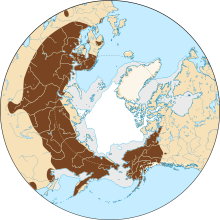Tundra vole
The tundra vole (Microtus oeconomus) or root vole is a medium-sized vole found in Northern and Central Europe, Asia, and northwestern North America, including Alaska and northwestern Canada. In the western part of the Netherlands, the tundra vole is a relict from the ice age and has developed to the subspecies Microtus oeconomus arenicola.
| Tundra vole | |
|---|---|
_(9-4-08)_gambell%2C_ak_-2_(2834490753).jpg) | |
| Tundra vole in Alaska | |
| Scientific classification | |
| Kingdom: | Animalia |
| Phylum: | Chordata |
| Class: | Mammalia |
| Order: | Rodentia |
| Family: | Cricetidae |
| Subfamily: | Arvicolinae |
| Genus: | Microtus |
| Subgenus: | Alexandromys |
| Species: | M. oeconomus |
| Binomial name | |
| Microtus oeconomus (Pallas, 1776) | |
 | |
It has short ears and a short tail. Its fur is yellowish brown with paler sides and white underparts. They are about 18 cm (7.1 in) long with a 4 cm (1.6 in) tail and weigh about 50 grams (1.8 oz).
This species is found in damp tundra or moist meadows, usually near water. It makes runways through the surface growth in warm weather and tunnels through the snow in winter. It feeds on grasses, sedges and seeds.
Female voles have three to six litters of three to 9 young in a shallow burrow. The vole population in a given area can vary greatly from year to year.
It is active year-round. It also digs burrows where it stores seeds and roots, especially licorice root, for the winter. The species epithet oeconomus refers to this "economical" behaviour.
Subspecies
There are several subspecies of tundra vole.[1][2]
- M. o. amakensis - Amak Island tundra vole - Alaska, United States
- M. o. arenicola - Dutch tundra vole - Netherlands
- M. o. elymocetes - Montague Island tundra vole - Alaska, United States
- M. o. finmarchicus - Norwegian tundra vole - Norway
- M. o. innuitus - St. Lawrence Island tundra vole - Alaska, United States
- M. o. medius - Norwegian tundra vole - Norway
- M. o. mehelyi - Central European tundra vole - Austria, Hungary and Slovakia
- M. o. oeconomus
- M. o. popofensis - Shumagin Islands tundra vole - Alaska, United States
- M. o. punakensis - Punuk Islands tundra vole - Alaska, United States
- M. o. sitkensis - Alexander Archipelago tundra vole - Alaska, United States
- M. o. unalascensis - Unalaska tundra vole - Alaska, United States
References
| Wikimedia Commons has media related to Microtus oeconomus. |
- Linzey, A.V.; Shar, S.; Lkhagvasuren, D.; Juškaitis, R.; Sheftel, B.; Meinig, H.; Amori, G. & Henttonen, H. (2008). "Microtus oeconomus". IUCN Red List of Threatened Species. 2008. Retrieved 4 February 2010.CS1 maint: ref=harv (link)
- Witte van den Bosch, R. and Bekker, D. (2009). Verdwijnt de oer-Hollandse lemming? Geschiedenis en toekomst van de noordse woelmuis. Zoogdier 20-4: p.p 3-7. (in Dutch)
- Musser, G. G. and M. D. Carleton. 2005. Superfamily Muroidea. pp. 894–1531 in Mammal Species of the World a Taxonomic and Geographic Reference. D. E. Wilson and D. M. Reeder eds. Johns Hopkins University Press, Baltimore.
